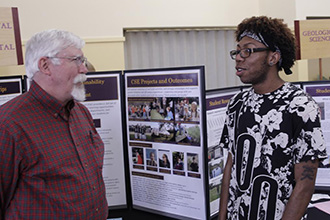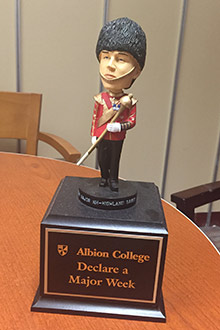Major Moment: When Explorations Become Declarations
Albion’s annual Declare a Major event features important student choices—and some friendly department competition
February 27, 2017
By Chuck Carlson

Geology professor Tim Lincoln (left) speaks with communication studies major Jaren Johnson, ’19, during the Declare a Major event February 21 in Upper Baldwin.
For Kayode Opoku, ’19, this was more of a minor detail than a major issue.
The native of Ghana came to Albion’s Declare a Major event February 21 at Upper Baldwin already knowing he was going to double-major in philosophy and psychology. His issue was what to pick as his minors.
And so, after walking around, talking to professors from various disciplines and considering his options, Opoku decided to minor in English and international studies.
His plans after graduation? He’ll help run his uncle’s psychology practices in Ghana, then open one of his own.
“That’s where psychology comes in,” Opoku said. “Then I’d like to start my own newspaper, and that’s where English comes in. As for international studies, knowing what’s going on in the world is important.”
For Chelsei Carpenter, ’19, from Muncie, Ind., this was an opportunity to reset her goals.
“It was one of those things where I started off in a completely different field,” she said.
But after coming to Albion intent on studying biochemistry, she has now switched to psychology and business and she may not be done.
“Professors talked to me about things I never thought about before,” she said. “It all fits in.”
The event remains a necessary part of the undergraduate process for both student and college. In the end, after all, a student must decide on a major to complete the graduation process.
Some come to school knowing exactly what they want to do and never stray from that path. Others come with an idea and change their mind as they take other classes. Even more come with no clue what they want and develop their interests.
On this day, 58 majors, 31 minors and two concentrations were declared. And that’s a start.
Indeed, one of the biggest challenges for colleges everywhere is to get students to declare their major. This year, Troy Kase, director of the Career and Internship Center, said more than 400 students were undeclared heading into the event—276 first-year students, 141 sophomores, 28 juniors and, yes, even two seniors.
“We’re pushing for the end of their sophomore year for them to declare,” said Kase, who knows that sometimes it just doesn’t happen. “There are those who don’t know what they want to do and there are those who are undecided and don’t know yet that they’re undecided. It can be a tough time for them. It can be an empty feeling.”
This event to accelerate declarations took root during the 2012-13 academic year with now-retired Provost Susan Conner and current Associate Provost John Woell.
That’s where the bobblehead comes in.

To the victor go the spoils: the prize for the academic program with the biggest percentage jump in majors.
In an effort to get faculty involved and work with still-undecided students on selecting a major, Conner and Woell came up with the idea of a trophy to be awarded to the department with the largest percentage increase in majors from one year to the next.
“We were thinking, ‘How do we get kids to declare?’” Woell said with a smile. “Let’s make it fun and make it stupid. The idea was to make it a traveling trophy, kind of like the [NHL’s] Stanley Cup.”
So Woell scoured the Internet and found a bobblehead doll from the New Hampshire Highland Games that resembled the uniform of Albion’s British Eighth Marching Band.
The Center for Sustainability and the Environment won the first year; Economics and Management won the second year; Art and Art History took the trophy in year three; and Chemistry is the defending champ.
The winner for this year will be announced at the spring faculty meeting March 16.
And while Woell mentions it’s all in fun, the goal remains vital because, he said, studies over the years have shown that students who do declare a major tend to stay at the school. Woell added that, at Albion, students who declare a major are assigned an academic advisor for that field instead of a more general first-year advisor.
“This is part of a broader effort to get students to declare,” he said.
But even after Declare a Major, Drew Dunham, Albion’s associate dean of academic affairs and registrar, said students can, and do, change their minds.
“If they turn in paperwork today at 4:30 and change their minds at 5:30, they can just go online and change it again,” he said. “I suspect most sophomores have decided but they just haven’t turned in the paperwork. They’re just not sure and that’s why they hesitate.”
Count Carpenter among them.
“I came here and I was going to make a beeline [to declare],” she said. “But some of the other professors had some interesting proposals, so I may add another minor.”